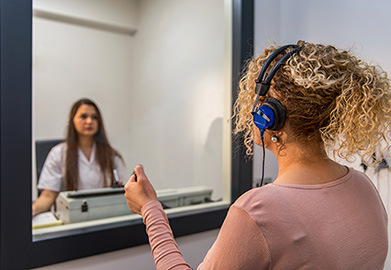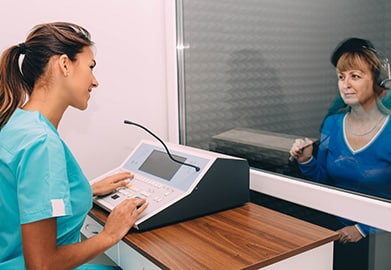What Happens During a Hearing Test?


If you think you may have hearing loss, the only way to be sure is to have a hearing test. Hearing loss can affect anyone and often comes on slowly, making it hard to notice until you’re experiencing symptoms. This can affect your overall health as well, so it’s important to catch it early so it can be treated. Getting a baseline hearing test and regular follow-ups can help you monitor your hearing, making it easier to find any changes or irregularities. A hearing test is easy, painless, and can help you better understand your health. Learn about what you can expect during a test.
Discussing Your Hearing Health History
One of the first things that will happen at your appointment is a discussion of your hearing health history. This allows the specialist to identify any concerns you may have. This medical history can also help provide insight into what type of hearing loss you have, and if it may be inherited, genetic, acquired or environmental. Occasionally, other medical conditions such as allergies, ear infections, colds, or impacted earwax can be a contributing factor to your hearing loss, so getting a full health history is quite useful.
In addition to overall health factors, the hearing specialist may inquire about whether you have experienced any head trauma, as injuries can cause hearing damage. They might also ask about your exposure to loud sounds at work or in your personal life. This can include working with loud machinery or frequently going to concerts or events.
Once your history has been taken, you will likely have time to discuss your symptoms with the specialist. You will be able to tell them what you are experiencing and how it is affecting your life. Be sure to include information about what you like to do and how your hearing loss is making it difficult or frustrating.
Conducting a Hearing Test
A hearing test is non-invasive and painless. Often, you will be seated in a sound-proof room or booth designed to keep any outside noises from impacting your test. You will put on headphones that will be connected to an audiometer, which is used to conduct the test.
The hearing test will test two different areas: pure tone and speech audiometry. Pure tone involves listening to different tones and indicating if you can hear them. These tones will be presented at different pitches/frequencies as well as different volumes., from louder to softer. The softest tone you can hear or detect is your threshold of hearing. Speech audiometry tests how well you can hear voices/words by determining the softest speech you can hear and repeat, and how many words you can repeat from a list presented at your comfortable listening level.
Understanding Your Hearing Test Results
Your test results will be placed on a graph called an audiogram. This graph shows the softest sounds you are able to hear at different frequencies and decibel levels of loudness. If you were to look at an audiogram, the vertical axis represents the intensity or volume of the sound that was presented, while the horizontal axis represents the frequency or pitch of the sound.
Each ear is plotted separately on the graph and is represented by two lines: O’s are the right ear and X’s are the left ear results/thresholds. They may be similar and follow the same curve, or, if you have one ear worse than the other, they may diverge. Hearing loss is broken up into several levels based on the results of the vertical axis:
- 0 – 25 dB HL – Normal hearing
- 26 – 40 dB HL – Mild hearing loss
- 41 – 70 dB HL – Moderate hearing loss
- 71 – 90 dB HL – Severe hearing loss
- Over 91 dB HL – Profound hearing loss
These results will indicate your level of hearing loss and provide more insight into how best to treat it.
Book Your Hearing Test with The Specialists at Bravo Hearing
Hearing is important, which is why the specialists at Bravo Hearing want to help you hear better. We will work with you to determine what the cause of your hearing loss is and assess what the best treatment and management will be. The sooner you begin to care for your hearing loss, the more of your natural hearing ability you may be able to retain. Our team offers ongoing support, recommendations, and hearing health services to our patients. If you are experiencing any signs of hearing loss, be sure to contact us to schedule a test by calling 647-694-4626 today.
Related:


